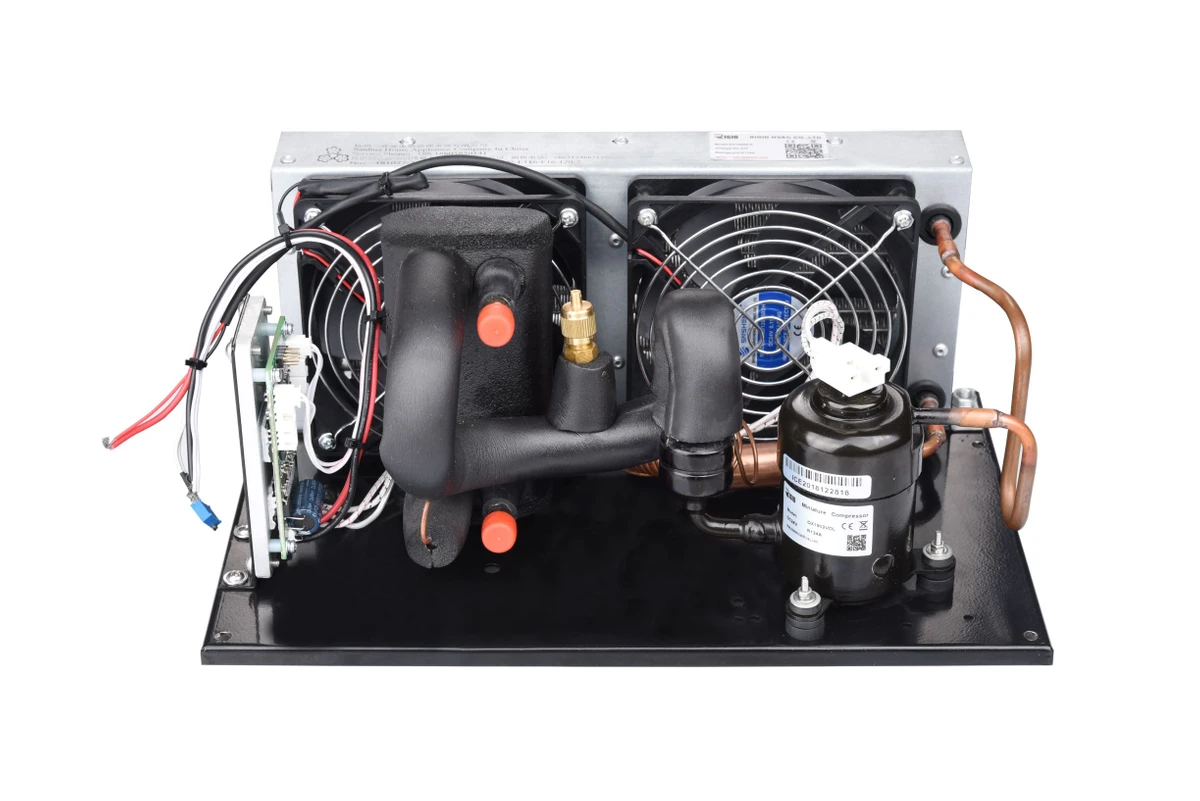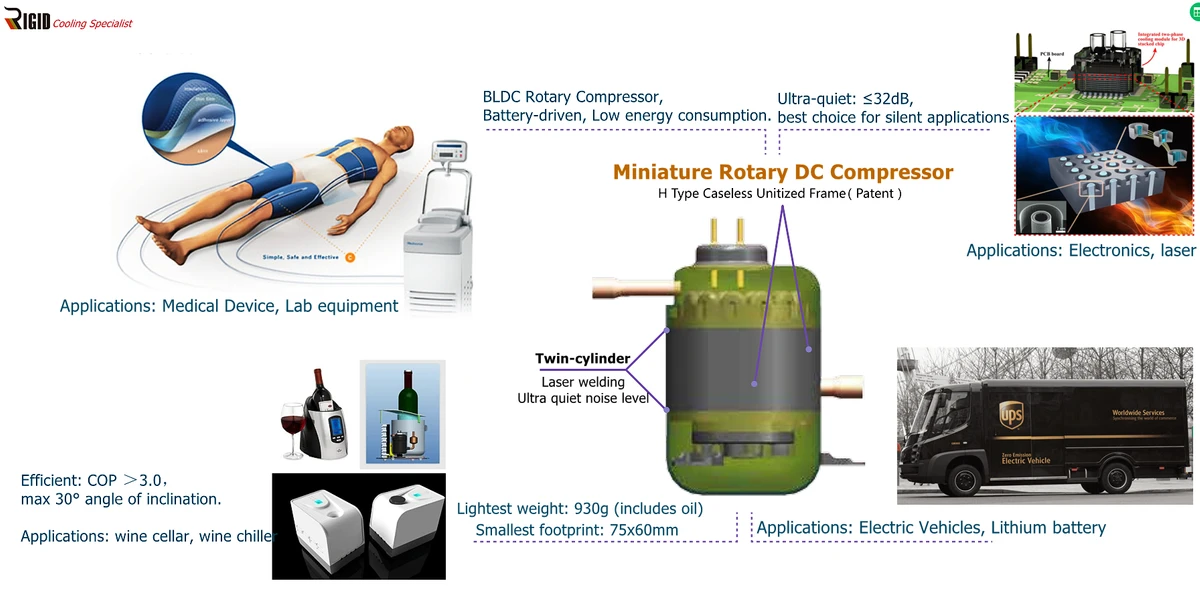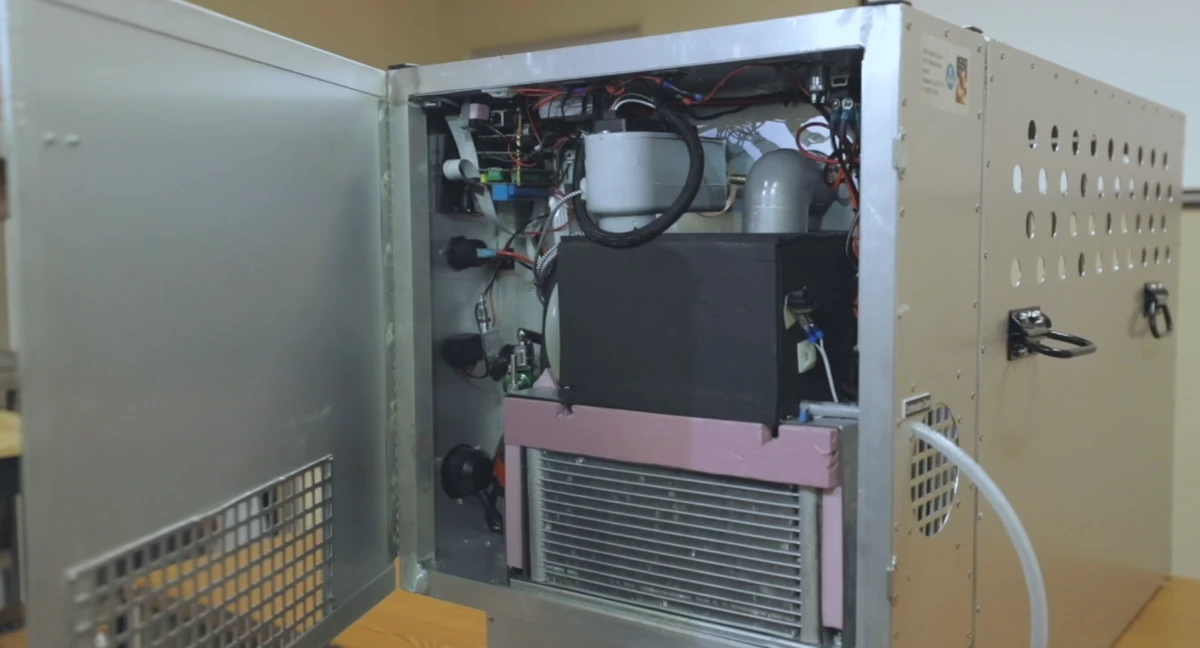Introduction

"RIGID is a miniature refrigerated compressor innovation leader in China. We keep looking for novel solutions in compact and portable cooling systems. We capture new technologies in mobile and compact cooling systems."
In the bustling world of commercial refrigeration, the compressor plays a pivotal role in maintaining optimal temperatures and preserving perishable goods. A reliable compressor for commercial refrigerators is not just a luxury; it’s a necessity that can significantly impact your bottom line. Understanding the costs associated with these compressors, along with key maintenance practices, is crucial for any business owner looking to invest wisely in their refrigeration systems.
Importance of a Reliable Compressor
When it comes to running a successful food service or retail operation, having a dependable compressor is paramount. It ensures that your products remain fresh and safe for consumption while minimizing energy costs and downtime. After all, an unreliable compressor can lead to spoilage and financial losses that no business wants to face.
Understanding Compressor Costs
So, how much does it cost to replace a commercial refrigerator compressor? The answer varies based on several factors such as brand, size, and installation complexity. However, knowing these costs upfront can help you make informed decisions about whether it's worth replacing the compressor on your refrigerator or investing in an entirely new unit.
Key Maintenance Practices
Regular maintenance is essential for extending the lifespan of your refrigeration system and avoiding costly repairs down the road. This includes understanding how do you reset a commercial refrigerator compressor when necessary and recognizing signs that indicate your unit needs service.
Choosing the Right Compressor

Selecting the right compressor for your commercial refrigerator is crucial for ensuring optimal performance and energy efficiency. A well-chosen compressor can save you money on energy bills and reduce the frequency of repairs. With various options available, understanding how to choose the right one can make all the difference in your refrigeration needs.
How to Determine the Right Size
To determine what size compressor you need for your refrigerator, start by assessing your cooling requirements based on the size of your space and the volume of items stored. Generally, larger refrigerators require more powerful compressors to maintain consistent temperatures. If you're unsure, consulting with a professional or using manufacturer guidelines can help clarify which compressor will fit best—after all, nobody wants to overpay or underperform!
Factors Influencing Your Choice
Several factors influence your choice of a compressor for commercial refrigerators, including energy efficiency ratings, noise levels, and specific cooling needs based on application type. Additionally, consider how much it costs to replace a commercial refrigerator compressor when budgeting for long-term operational expenses; this will help you weigh initial costs against future savings. Don't forget about brand reputation—reliable brands often offer warranties that can save you money in service costs down the line.
Top Brands to Consider
When selecting a compressor for commercial refrigeration, several top brands stand out due to their quality and reliability. RIGID is a notable player in this space; they specialize in mini compressors that are innovative and efficient for compact cooling systems. Other reputable brands include Copeland and Embraco—both known for their durable commercial freezer compressors that meet various industry standards while providing excellent performance.
Installation Best Practices

Installing a compressor for a commercial refrigerator is a critical step that can greatly influence its performance and longevity. Whether you choose professional installation or decide to tackle it yourself, understanding the best practices can save you time, money, and potential headaches down the line. This section will guide you through the considerations involved in installation, common pitfalls to avoid, and how to ensure your system operates efficiently.
Professional Installation vs DIY
While it might be tempting to save on costs by doing it yourself, improper installation can lead to significant issues down the road—think leaks or inefficient cooling. Plus, professionals have the experience and tools needed to get it right the first time; after all, no one wants to ask themselves How much does it cost to replace a commercial refrigerator compressor? because of a simple mistake during installation.
On the flip side, if you're handy and willing to learn, DIY can be an option—but do your research first! Understanding how do you reset a commercial refrigerator compressor or determining what size compressor you need for your refrigerator is crucial before diving in. Just remember that any savings from DIY could quickly evaporate if something goes wrong.
Common Mistakes to Avoid
Even seasoned technicians can make mistakes when installing compressors for commercial refrigerators; it's part of being human! One common error is not properly leveling the unit—an uneven setup can cause strain on components leading to premature failure. Another pitfall is neglecting proper electrical connections; loose wires or incorrect voltage can create hazardous situations that could leave you asking whether it's worth replacing the compressor on your refrigerator when things go awry.
Additionally, failing to read manufacturer guidelines is like throwing darts blindfolded—you might hit something but chances are you'll miss more than you'll hit! Make sure you're familiar with specifics related not only to your chosen model but also with any unique requirements for commercial freezer compressors if applicable. Taking these precautions ensures smoother sailing during both installation and operation.
Ensuring Energy Efficiency
Once installed correctly, ensuring energy efficiency should be at the forefront of your mind when operating compressors for commercial refrigerators. An energy-efficient unit not only saves money on utility bills but also contributes positively toward environmental sustainability—a win-win scenario! Regularly checking seals and insulation will help maintain optimal performance levels while keeping those pesky energy costs in check.
Moreover, consider using advanced technology solutions like those offered by RIGID—the mini compressor innovation leader in China—to enhance efficiency further. Their focus on compact cooling systems means you're investing in quality without sacrificing space or power consumption. With options tailored specifically for micro refrigeration applications available from RIGID, you'll be well-equipped for future challenges while enjoying superior design and uncompromising quality.
In conclusion, whether opting for professional installation or going down the DIY route, being aware of common mistakes and striving for energy efficiency will pay off significantly in both performance and cost-effectiveness over time!
Maintenance for Longevity

Maintaining your compressor for commercial refrigerator is crucial for ensuring its longevity and efficiency. Regular maintenance not only extends the lifespan of the equipment but also helps to avoid costly repairs down the line. By implementing a proactive maintenance routine, you can save money and keep your refrigeration system running smoothly.
Regular Checks and Balancing
Regular checks and balancing of your compressor are essential practices that can prevent major issues later on. Start by monitoring the pressure levels; if they deviate from manufacturer specifications, it could indicate an underlying problem. Additionally, ensure that all electrical connections are secure and free from corrosion to maintain optimal performance.
It's also important to check the refrigerant levels in your compressor for commercial refrigerator periodically. Low refrigerant levels can lead to decreased cooling efficiency and increased wear on the compressor itself. Balancing these elements will help you get a clearer picture of whether you need to ask yourself, How do I know what size compressor I need for my refrigerator? as improper sizing can lead to inefficiencies.
Signs Your Compressor Needs Service
Recognizing signs that your compressor needs service is key to maintaining its functionality. If you notice unusual noises or vibrations coming from your commercial freezer compressor, it might be time to investigate further. Additionally, if there's a noticeable increase in energy bills without a corresponding increase in usage, this could indicate that your system isn't operating efficiently.
Other red flags include inconsistent temperatures within the unit or frequent cycling on and off; these symptoms often signal that something is amiss with the compressor's operation. Knowing when to ask, Is it worth replacing the compressor on a refrigerator? is crucial; sometimes timely repairs can solve minor issues before they escalate into significant problems requiring replacement.
Importance of Cleaning Coils
Cleaning coils is another vital aspect of maintaining your refrigeration system's longevity. Dust and debris accumulation on condenser coils can significantly hinder heat exchange efficiency, leading to overworking of the compressor for commercial refrigerator units. A dirty coil may cause overheating, which not only affects cooling performance but also increases energy consumption—definitely something you'd like to avoid!
Regularly cleaning both evaporator and condenser coils ensures optimal airflow and efficient operation of your commercial freezer compressor as well. It's recommended to schedule this cleaning at least twice a year or more frequently in dusty environments. Remember: keeping those coils clean means less stress on the system overall—saving you time, money, and potential headaches down the road!
Understanding Compressor Costs

How Much Does It Cost to Replace a Commercial Refrigerator Compressor?
The cost of replacing a commercial refrigerator compressor can vary significantly based on several factors, including the type of unit and labor costs in your area. On average, you might expect to pay anywhere from $1,000 to $2,500 for parts and installation combined. Additionally, if you own a commercial freezer compressor or other specialized equipment, those prices can soar even higher due to specific requirements.
It's essential to consider both the price of the compressor itself and the labor involved in installation when evaluating your total expenses. A high-quality compressor for commercial refrigerators may come at a premium but could save you money in energy costs over time. Always request quotes from multiple technicians or service providers to ensure you're getting the best deal.
Is It Worth Replacing the Compressor?
When faced with a malfunctioning unit, many ask themselves: Is it worth replacing the compressor on a refrigerator? The answer often hinges on factors like age, overall condition of the appliance, and repair history. If your refrigerator is relatively new and has been well-maintained, investing in a new compressor can be worthwhile as it may extend its lifespan significantly.
Conversely, if your unit is older or has had numerous repairs already, it might be more sensible financially to replace the entire system instead of just swapping out that old compressor for commercial refrigerator use. Evaluating how much you’ve spent on repairs versus potential future costs will help guide your decision-making process.
Budgeting for Maintenance
Budgeting for maintenance is an essential part of owning any refrigeration system; after all, no one wants unexpected expenses sneaking up on them! Regular upkeep can prevent costly breakdowns and prolong your investment’s life span—so factor this into your annual budget right alongside those “how do I know what size compressor I need for my refrigerator?” queries.
Setting aside funds specifically for routine checks or emergency repairs ensures you're prepared when issues arise—like wondering how do you reset a commercial refrigerator compressor? This proactive approach not only protects your bottom line but also keeps operations running smoothly without costly interruptions.
Handling Refrigeration Issues

When dealing with a compressor for commercial refrigerators, it's crucial to know how to reset it and troubleshoot common problems. These skills can save you time, money, and potential loss of inventory. Understanding when to call in the experts is also essential for maintaining efficiency and prolonging the lifespan of your refrigeration system.
How Do You Reset a Commercial Refrigerator Compressor?
Resetting a commercial refrigerator compressor is often straightforward, but it varies by model. Generally, you can begin by unplugging the unit from its power source for about five minutes; this allows the system to reset itself. After plugging it back in, monitor the compressor's operation—if it doesn’t start after a few minutes or continues to cycle on and off frequently, further investigation may be necessary.
Knowing how much does it cost to replace a commercial refrigerator compressor can help you weigh your options if resetting doesn't solve the problem. If the issue persists after resetting or if you find that your compressor is making unusual noises or not cooling properly, consider whether it's worth replacing the compressor on your refrigerator instead of attempting more repairs.
Troubleshooting Common Problems
Common problems with compressors for commercial refrigerators include overheating, strange noises, and inadequate cooling performance. If your unit isn’t cooling as expected, first check if there’s proper airflow around the unit; obstructed vents can cause significant issues. Additionally, listen for any rattling or grinding sounds that may indicate mechanical failure—these signs could mean it's time to replace your commercial freezer compressor.
Another critical aspect of troubleshooting is understanding how do I know what size compressor I need for my refrigerator? The right size ensures efficient operation and longevity; an undersized unit will struggle while an oversized one will cycle too frequently. Always refer to manufacturer specifications when assessing compatibility and capacity.
When to Call in the Experts
While many minor issues can be resolved independently, knowing when to call in experts is vital for complex problems involving compressors for commercial refrigerators. If you've tried resetting or basic troubleshooting without success—or if you're unsure about handling electrical components—it’s wise to consult professionals who specialize in refrigeration systems.
Professional technicians have experience diagnosing issues that might not be apparent at first glance; they’ll also provide insights into whether it's worth replacing the compressor on your refrigerator based on its age and condition. Ultimately, investing in expert help could save you from costly mistakes down the line—especially when dealing with high-stakes equipment like a commercial freezer compressor.
Conclusion

The journey through understanding compressors for commercial refrigerators culminates in a few vital takeaways. Making informed decisions about your compressor will not only enhance operational efficiency but also save you money in the long run. By investing in quality compressors and staying updated on innovations, you can ensure your refrigeration needs are met effectively.
Making Informed Decisions
Understanding how to determine what size compressor you need for your refrigerator can prevent costly mistakes and ensure optimal performance. Moreover, being aware of the costs associated with replacing a commercial refrigerator compressor helps you weigh whether it’s worth replacing the compressor on a refrigerator or opting for a new unit altogether.
Investing in Quality Compressors
Quality should never be compromised when selecting a compressor for commercial refrigeration applications. Investing in reputable brands can lead to fewer breakdowns and longer service life, saving you money on repairs and replacements down the line. Brands like RIGID exemplify this commitment to quality with their innovative mini compressors that cater to various cooling needs while remaining budget-friendly.
The Future of Mini Compressors with RIGID
As we look ahead, mini compressors are poised to revolutionize how we think about refrigeration solutions. RIGID stands at the forefront of this movement, offering cutting-edge technology that is both efficient and compact—perfect for modern-day demands. With an emphasis on custom-made solutions, RIGID not only meets specific client requirements but also positions itself as a leader in micro cooling systems.